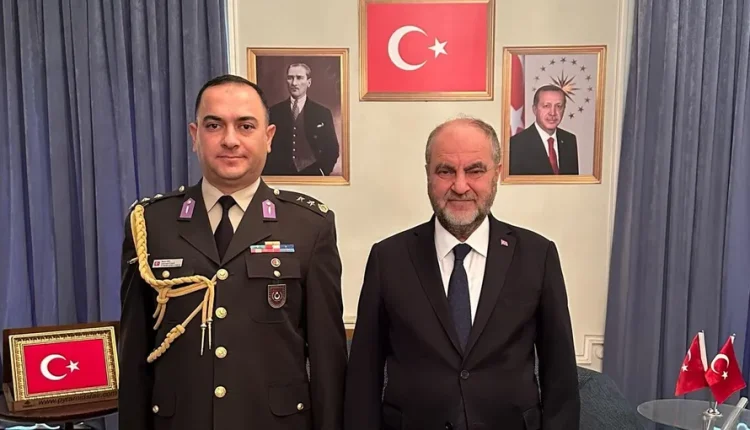Turkey Appoints Military Attaché to Damascus as Post-Assad Syria Reshapes Diplomacy
By Kardo Roj
DAMASCUS, Syria (North Press) – Turkey has formally deployed a military attaché to its embassy in Damascus, marking a significant shift in Ankara’s engagement with Syria following the fall of Bashar al-Assad’s government. The Turkish Embassy announced on Wednesday that Lieutenant Colonel Hasan Göz has officially assumed his post, symbolizing a new phase in Turkish-Syrian relations.
The announcement, made via social media platform X, was accompanied by a photo of Göz with Turkish Ambassador Burhan Kor Oğlu. “Military cooperation with our Syrian brothers continues to develop,” the statement read, reflecting Ankara’s recalibrated approach to Syria in the wake of Assad’s removal from power.
The appointment comes as Syria undergoes a dramatic political transformation. Following Assad’s ouster, a transitional government—composed of opposition figures, military defectors, and civil society leaders—has sought to reestablish diplomatic ties with regional and international actors. With Russian and Iranian forces no longer present in Syria, the power dynamics in the country have shifted, and Turkey is positioning itself as a key player in shaping Syria’s future.
The deployment of a Turkish military attaché suggests that Ankara seeks direct engagement with Syria’s new leadership, particularly on security cooperation and border stability. Turkey has long considered northern Syria a critical national security concern, especially regarding Kurdish-led forces.
While the new Syrian government has distanced itself from the policies of the Assad era, the issue of Turkish military presence in northern Syria remains unresolved. Ankara controls several areas, including Afrin, Jarablus, and parts of Idlib, and has previously expressed reluctance to withdraw without guarantees regarding border security and Kurdish armed groups.
Sources close to Syria’s transitional government indicate that discussions with Turkey are ongoing. Damascus seeks a phased withdrawal of Turkish forces, while Ankara is pushing for security agreements that address its concerns about Kurdish militias and potential cross-border threats.
The reestablishment of military-diplomatic ties between Turkey and Syria has been met with varied responses.
The Arab League, which recently reintegrated Syria after years of suspension, has cautiously welcomed Turkey’s engagement, seeing it as a step toward stabilizing the region.
Western governments, particularly the United States and the European Union, are closely monitoring developments. While Washington remains focused on counterterrorism operations in Syria, it has urged Turkey to coordinate its policies with the new Syrian leadership.
Syrian opposition groups, many of whom have previously relied on Turkish support, are divided. Some view Ankara’s diplomatic shift as a pragmatic necessity, while others fear a deal could come at their expense.
Turkey’s decision to send a military attaché to Damascus signals its intent to shape Syria’s post-Assad trajectory. However, significant challenges remain, particularly regarding the future of Turkish-controlled territories, security arrangements along the border, and the broader political reconstruction of Syria.
With Syria’s transitional government seeking to normalize relations with its neighbors, further diplomatic engagements between Ankara and Damascus are expected in the coming months. The success of these efforts will depend on how both sides navigate their strategic interests and long-standing tensions.

